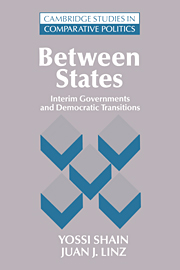Book contents
- Frontmatter
- Contents
- Preface
- Contributors
- PART ONE THEORY
- Introduction
- 1 Provisional governments: Revolutionaries and moderates
- 2 The power-sharing model
- 3 The caretaker government model
- 4 The international interim government model revisited
- 5 The timing and nature of first democratic elections
- 6 Conclusions
- PART TWO CASE STUDIES
- Index
5 - The timing and nature of first democratic elections
Published online by Cambridge University Press: 05 August 2012
- Frontmatter
- Contents
- Preface
- Contributors
- PART ONE THEORY
- Introduction
- 1 Provisional governments: Revolutionaries and moderates
- 2 The power-sharing model
- 3 The caretaker government model
- 4 The international interim government model revisited
- 5 The timing and nature of first democratic elections
- 6 Conclusions
- PART TWO CASE STUDIES
- Index
Summary
Democracy calls for deep-going, value-oriented changes in the public mentality – it calls for time
Karl PopperFINDING THE RIGHT PACE
In the process of political change much depends on pacing. Sometimes small steps create an expectation of change in reasonable time, and the incremental process of change can sustain that expectation even though the change itself might be small. A paced process can reduce both the fears of those afraid of change and the impatience of those demanding immediate change. One of the most difficult tasks for politicians is to find the right pace for their actions, neither too fast nor too slow, and preferably one step ahead of the expectations of their opponents.
“What is the right pace?” is a central question in transitions to democracy. Giuseppe Di Palma, in his book To Craft Democracies, has made a strong argument (mostly on the basis of his excellent knowledge of the transitions in Southern Europe) in favor of swift democratization in all countries, regardless of the nature of the old regime, the political culture, or other sociopolitical dimensions of a country. He asserts that quick elections have the tendency “to curb chaos” and “even when variously thwarted, confined, manipulated, or just not in the cards, once they are called, elections can still energize and possibly protect democratization beyond the hopes or fears, and indeed beyond the understanding, of the principal actors.” Other scholars are more cautious.
- Type
- Chapter
- Information
- Between StatesInterim Governments in Democratic Transitions, pp. 76 - 91Publisher: Cambridge University PressPrint publication year: 1995



